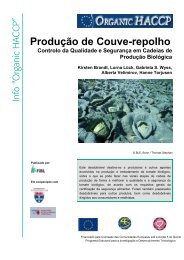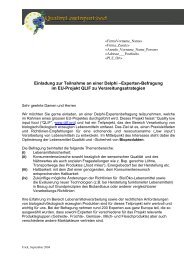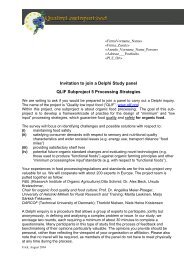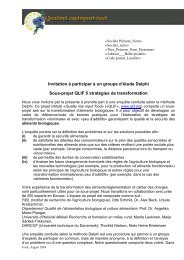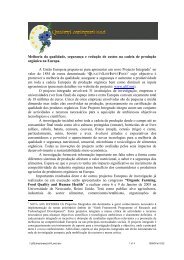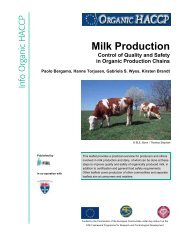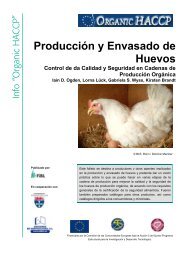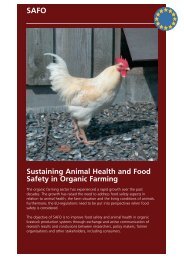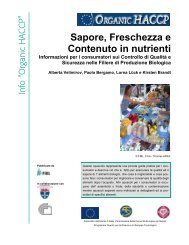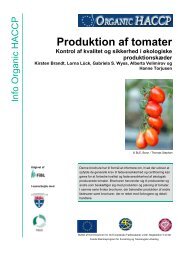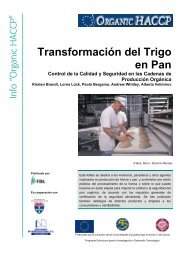ORGANIC SEED PROPAGATION: CURRENT STATUS AND ...
ORGANIC SEED PROPAGATION: CURRENT STATUS AND ...
ORGANIC SEED PROPAGATION: CURRENT STATUS AND ...
Create successful ePaper yourself
Turn your PDF publications into a flip-book with our unique Google optimized e-Paper software.
ENVIRFOOD<br />
FP6-2003-SSA-1-007003<br />
Deliverable 4<br />
• For organic growers, the obligation to use organically produced seed limits their<br />
choice of crops; because the market for organic seeds is small, seed companies<br />
produce organic seed for only few cultivars and crop varieties.<br />
• Every year, new cultivars are brought onto the market (for example, Bremia resistant<br />
lettuce varieties), but organic seed for these varieties is not immediately available.<br />
• It is difficult for organic growers to meet market demands for special vegetable<br />
varieties (with different tastes, shapes, colours) if organic seed or propagating material<br />
for these varieties is not available. Among others, this is a problem for growers of<br />
greenhouse vegetables such as tomatoes and sweet peppers.<br />
• The price of organically produced seed is unnecessarily high, partly due to the limited<br />
number of market players (seed companies).<br />
• The higher price of organically produced seed cannot (yet) be passed on to the<br />
consumers therefore organic growers have to sacrifice part of their profits.<br />
• Farmers who do not use organic seed are able to produce their crops at lower costs,<br />
leading to unfair competition.<br />
Main issues of seed companies:<br />
• Organic seed production is difficult, pioneering work. For example, a seed company<br />
trying to meet market demands for 200 metric tonnes of spring wheat seed had to<br />
double its production area to produce 350 tonnes: the extra production is necessary as<br />
part of the harvest is of inferior quality and another part may be rejected because of<br />
root rot.<br />
• It is too easy for farmers to obtain derogations, leaving seed companies with unsold<br />
stock.<br />
• To avoid the use of (expensive) organic seed, farmers may misuse the database, and<br />
this could lead to great profit losses for seed producers. For example, when the Bejo<br />
seed company registered on the database an onion variety that used to be a non-treated<br />
seed variety popular with organic growers, many farmers tried to avoid the obligation<br />
to purchase the more expensive organic seed by switching to other onion varieties, for<br />
which organic seeds were not available.<br />
• There is a serious lack of organic seed producers. Seed companies should be<br />
stimulated to participate.<br />
• A level playing field for farmers is necessary.<br />
The Netherlands plans for 2005. The Netherlands will introduce a new National Annex<br />
of species and varieties excluded from the scope of derogation. Early November 2004, expert<br />
meetings were held to determine which crops should be listed on the 2005 Annex. Crops were<br />
tested by the following criteria:<br />
• Are the main varieties of the species available?<br />
• Are suitable varieties available to cover all growing seasons and possible uses? If not,<br />
the Dutch government wishes to know what is needed to improve coverage for 2006<br />
and/or later years.<br />
• Is a division into subspecies or sub-varieties advisable?<br />
• Are some of the varieties interchangeable?<br />
• Are there at least two seed suppliers for this crop?<br />
• In the case of “small” crops (for which total planting area is small): Is suitable organic<br />
seed available from at least one supplier? And have there been derogation requests for<br />
this species in 2005?<br />
Percentage rule<br />
11




